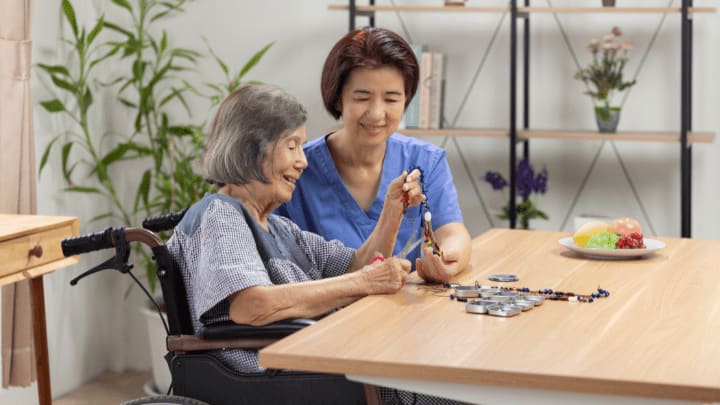What is Dementia and its Impact on Individuals and Their Loved Ones?
Dementia is a term used to describe a group of conditions characterized by a decline in cognitive abilities, such as memory, reasoning, and communication skills. It is a progressive disorder that affects an individual's ability to perform daily activities and can have a profound impact on their quality of life. The most common form of dementia is Alzheimer's disease, which accounts for approximately 60-80% of all cases.
The impact of dementia is far-reaching, affecting not only the individual but also their loved ones and support system. If you're seeking assistance in caring for someone with dementia care near Broken Arrow, OK, exploring dementia care options in the area may provide the support and resources you need.
Understanding the Stages of Dementia and its Progression
It is important to note that the progression of dementia can vary from person to person, and some individuals may experience a more rapid decline than others. The stages of dementia can be broadly categorized as follows:
-
Early Stage (Mild Dementia): In this initial stage, individuals may experience mild cognitive impairment, such as memory lapses or difficulty finding the right words. However, they can generally function independently and carry out most daily activities.
-
Middle Stage (Moderate Dementia): As dementia progresses, individuals may experience more significant memory loss, confusion, and difficulty with tasks like dressing, bathing, and managing finances. They may require assistance with daily activities and exhibit changes in behavior or personality.
-
Late Stage (Severe Dementia): In the final stage, individuals with dementia may experience severe cognitive impairment, lose the ability to communicate or recognize loved ones, and require around-the-clock care for all aspects of daily living.
The Importance of Seeking Professional Help and Resources for Dementia Care
Caring for a loved one with dementia can be daunting, and it is crucial to seek professional help and support. Healthcare professionals, such as physicians, nurses, and social workers, can provide valuable guidance and resources to help manage the condition and ensure the well-being of individuals with dementia and their caregivers.
Support groups and community organizations can also be invaluable resources. They offer educational materials, counseling services, and opportunities to connect with others facing similar challenges. These resources can provide caregivers with practical advice, emotional support, and respite care options.
Tips for Creating a Safe and Supportive Environment at Home for Individuals with Dementia
-
Simplify the Living Space:
-
Minimize clutter and remove unnecessary items that may cause confusion or pose safety risks.
-
Use clear labels or pictures to identify rooms, cabinets, and drawers.
-
Establish Routines:
-
Develop consistent routines for daily activities, such as meals, bathing, and bedtime.
-
Use visual cues, reminders, or alarms to help maintain routines.
-
Promote Safety:
-
Consider using tracking devices or alarms to monitor your loved one's movements if they are prone to wandering.
-
Ensure emergency numbers and contact information are readily available and visible.
-
Create a Calming Atmosphere:
-
Use soothing colors, soft lighting, and familiar objects to create a comforting environment.
-
Play calming music or nature sounds to promote relaxation.

Effective Communication Strategies for Interacting with Individuals with Dementia
-
Be Patient and Compassionate:
-
Speak slowly and clearly, using simple language and short sentences.
-
Maintain eye contact and a calm, reassuring tone of voice.
-
Use Non-Verbal Communication:
-
Utilize gestures, facial expressions, and physical touch to convey meaning and provide reassurance.
-
Demonstrate tasks or activities instead of relying solely on verbal instructions.
-
Validate Feelings and Emotions:
-
Acknowledge and validate your loved one's feelings, even if their perceptions or memories seem inaccurate.
-
Avoid arguing or trying to reason with them, as this can lead to further confusion and distress.
-
Engage in Reminiscence:
-
Encourage your loved one to share memories and stories from their past.
-
Use familiar objects, photographs, or music to spark conversations and promote engagement.
-
Simplify Choices:
-
Offer limited choices or simple yes/no questions to avoid overwhelming your loved one.
-
Break down complex tasks into smaller, manageable steps.
Daily Routines and Activities to Promote Well-Being and Engagement for Individuals with Dementia
Maintaining a sense of purpose and engagement is crucial for dementia patients. We can significantly enhance their overall well-being by incorporating structured routines and meaningful activities into daily life. Engaging in familiar tasks can provide comfort and stimulation, while physical exercise helps maintain mobility and health. Sensory experiences and time spent outdoors offer additional opportunities for enjoyment and enrichment.
Self-Care for Caregivers of Individuals with dementia
Caring for a loved one with dementia is incredibly demanding, both physically and emotionally. To provide consistent, high-quality care, caregivers must prioritize their well-being. This includes seeking support from others, practicing self-compassion, and taking regular breaks. Maintaining a healthy lifestyle through balanced nutrition, physical activity, and relaxation techniques is crucial. If feelings of stress, anxiety, or depression become overwhelming, professional help should be sought. Remember, caring for yourself isn't selfish; it's essential for your ability to care for your loved one.
Providing the Best Care and Support for Your Loved One with Dementia
Caring for a loved one with dementia is a journey that requires patience, understanding, and a comprehensive approach. By understanding the stages of dementia, seeking professional help and resources, creating a safe and supportive environment, communicating effectively, and engaging in meaningful activities, you can enhance your loved one's quality of life and ensure their well-being.
Iris Memory Care of Tulsa provides specialized care for individuals with dementia in the Broken Arrow area. As a senior living community, we offer a supportive and secure environment tailored to the unique needs of those with memory loss.

